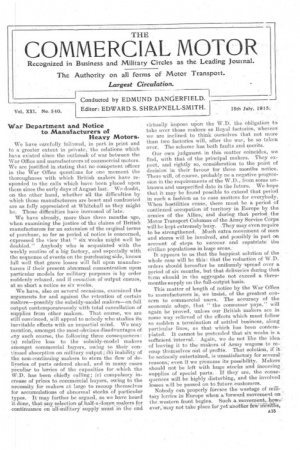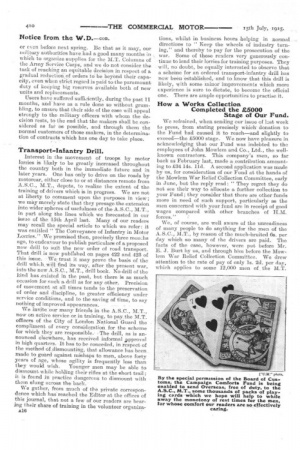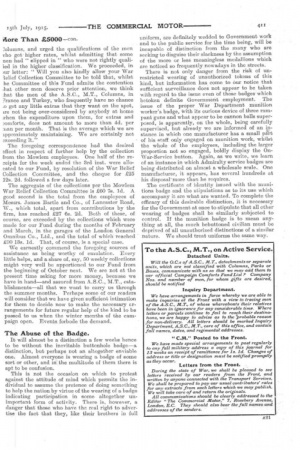War Department and Notice • to. Manufacturers of Heavy Motors.
Page 1

Page 2

Page 3

If you've noticed an error in this article please click here to report it so we can fix it.
We have carefully followed, in part in print and to a greeter extent in private, the relations which have existed since the outbreak of war between the War Office and manufacturers of commercial motors. We are justified in stating that no competentOfficer in the War Office questions for one moment the thoroughness with which British makers have responded to the calls Which have been placed upon them since the early days of August last. • We doubt, on the other hand, whether all the difficulties by which those manufacturers are-beset and confronted are as fully appreciated at Whitehall as they might be. Those difficulties have increased of late: We have already, more than three months ago, when examining the justice of the claim-s of British manufacturers for an extension of the original terms of purchase, So far as period of notice is concerned, expressed the view that " six weeks might well he doubled." Anybody who is acquainted with the weekly routine of a big factory, and especially with the sequence of events on the purchasing skle, knows full well that grave losses will fall upon manufacturers if their present abnormal concentration upon particular models for military purposes is by order suddenly relaxed, and if cessation of output ensues, at so short a notice as six weeks.
We have, also on several occasions, examined the arguments for and against the retention of certain makers—possibly the subsidy-model makers—on full output contemporaneously with total cancellation of supplies from other makers. That course, we are still convinced, will appeal to nobody who studies its inevitable effects with an impartial mind. We may mention, amongst the most-obvious disadvantages, of dny such course, the following three consequences: (a) relative loss to the subsidy-model makers amongst commercial buyers, owing to their continued absorption on Military output ; (b) inability of the non-continuing makers to stem the flow of deliveries of parts ordered ahead, and in many cases peculiar to lorries of the capacities for_ which the W.D. has been chiefly calling; (c) compulsory increase of prices to commercial buyers, owing to the necessity for makers at large to recoup themselves for accumulations of abnormal stocks of particular types. It may further be argued, as we have heard it dbne, that any selection of half.a-dozen makers for continuance on all-military supply must in the end virtually impose upon the W.D. the obligation to take over those makers as Royal factories, Whereas we are inclined to think ourselves that not morethan two factories will, after the war, be so taken over. The scheme has both faults and merits.
Our own judgmentin this matter coincides, we find, with that of the principal makers. They expect, and rightly 80, consideration to the Point of decision in their favour for three months notice. There will, of course, probably be a negative progression in the requirements of the W.D., from some unknown and unspecified date in the future. We hope that it may be found possible to extend that period in such -a fashion as to ease matters for everybody. When hostilities cease, there must be a period of continued occupation a. territory in Europe by the armies of the Allies,, and during that period. the Motor Transport COlumns of the Afrny Service Corps' will be kept extremely-blisy. They may even require to be strengthened. Much extra movement of men and stores will be involved, and possibly in part on account of steps to succourand repatriate the civilian populations-in huge areas.• It appears to us that the happiest solution of the whole case Will be this: that the reductinn of W.D. orders should hereafter be uniformly • spread over a period of six months, but that deliVeries during that term should in the aggregate not 'exceed a threemonths supply on the full-outPut basis.
This matter of length of notice by the War Office to manufacturers is, we insist, of the greatest concern to commercial users. The accuracy of the economic adage, that. " the consumer pays," will again be proved, unless our British makers are in some way relieved of the effects which must follow so sudden a termination of settled business, along particular lines, as that which has been contemplated. It cannot. be pretended that six weeks is a sufficient interval.. Again, we do not like the idea. of leaving_ it to' the makers of Army wagons to recoup themselves out Of Profit's. That solution, if it be seriously entertained, is unsatisfactory for several' reasons, even if we presume its possibility. Makers should not be left with huge stooks and incoming' supplies of special parts.. If they are, the cense.; querices willbe highly _disturbing, and the involved lasses will be passed on to.future.customers. Nobody _can properly foresee the wastage of military lorries in Europe when a'forward movement on the western front begins. Such. a_mov.ernent., }Owe; evermay not take place Ica yet' artatlier few' niciriths, or even before next spring. Be that as it may, our military authorities have had a good many months in which to organize supplies for the M.T. Columns of the Army Service CorPs, and we do not consider the task of reaching an equitable decision in respect of a gradual reduction of orders to' be beyOnd their caPas city, even when strict regard is paid to the paramount duty of kes:ping big reserves available both of new units and replacements.
Users have suffered suffioiently, during the past 11 months, anti:have as a rule done so without grumbling, to ensure that their side of the case will appeal strongly to the military officers with whom the decision rests, to the end that the makers shall be considered as far as possible, and through them the normal customers of those makers, in the determination of contracts which has one day to take place.
Transport-Infantry Drill.
Interest in the. movement of troops by motor lorries is likely to be greatly increased throughout the country both in the immediate future and in later years. One has only to drive on the. roads by motorcar, either close to or at distances remote from A.S.C., M.T., depots, to realize the extent of the training of drivers which is in progress. We are not at liberty to comment upon the purposes in view; we may merely state that they presage the extension into wider spheres of usefulness of the,..9..S.C., M.T., in part along the lines which we forecasted in our issue of the -1.5th April last. Many of our readers may recall the special article to which we refer: it was entitled " The Conveyance of Infantry in Motor Lorries." We promised then, precisely three monlis ago, to endeavour to publish particulars of a proposed new drill. to suit the new order of road transport. That drill is now published on pages 422 and 423 of this issue: • We: trust it may prove the basis of the drill whiCILWill find its way, after the present. war, bite the new X. S.C., M.T., drill book. No drill of the. kind has _existed in the past, but there is as much occasion for such' a drill as for any other. Precision of movement at all times tends to the preservation of order and discipline, to greater efficiency under service conditions, and to the. saving of time, to say nothing of improved appearances. , • • • We invite 'our many friends in the A.S.C.. M.T., now on active service or, in training, to paythe M.T, officers of the City of London National Guard the compliment of 'every consideration for the scheme for which they are responsible.The drill, as is announced elseWhere, has received informal gpproval in high quarters. It has to be conceded, in respect of the methed ef_clismounting, that allowance has been. made to guard-against mishaps to men, above forty years of age, *hose agility is frequently less than they would wish. Younger men may be able to dismount.while holding their rifles at the short trail; it, is found in practice dangerous to dim-jaunt with them slung across the. badk.
We gather, from much of the private correspondence which has reached the Editor at the offices of this journal, that not a few of our readers are bearing their share of training in the volunteer organiza A16 tions, whilst in business hours helping in normal directions to " Keep the wheels of industry turning," and thereby to pay for the prosecution of the war. Some of these readers very, generously continue to lend their lorries for training purposes. They will, no doubt, be equally interested to observe that a scheme for an ordered transport-infantry drill has now ben-established,• and to.know.that this drill is likely, with some. minor improvements which more experience is sure to dictate, to become the official one. There are ample opportunities to practise it.
How a Works Collection
Completed the £5000
Stage of Our Fund.
We refrained, when sending our issue. of last week to press, from stating precisely whiehdonation to the Fund had caused it to reach—and slightly to exceed—the 15000 stage. We now have pleasure in acknowledging that our Fund was indebted to the employees of John Mowlern and Co., Ltd., the wellknown contractors. This company's men, so far back as February last, made a .contribution amoonthig to £34 14s. 11d. A second application was made by us, for consideration of our Fund at the hands of the 3./lowlem War Relief Collection Committee, early in June, but the reply read:" They regret they do not see their way to allocate, a further collection to your Fund; they consider that there are other funds more in need of such support, particularly as the men concerned with your fund are in receipt of good wages compared with other branches of H.M. forces."
We, of course, are well aware of the unreadiness of many people to do anything for the men of the A.S.C., M.T., by reason of t•he much-bruited 6s. per day which so many of the drivers are paid. The facts of the case, however, were put before Mr. E. J. Burt by us, and through him before. the Mowlein War Relief Collection Committee. We drew attention to the rate of pay of only 1s. 2d. per day, which applies to some 12,000 men of the M.T. Jolunms, and urged the qualifications of the men vho got higher rates, whilst admitting that some nen had "slipped in" who were not rightly quailied in the higher classification. We proceeded, in ■ ur letter: " Will you also kindly allow your War lelief Collection Committee to be told that, whilst he Committee of this Fund admits the contention hat other men deserve prior attention, we think ;hat the men of the A.S.C., M.T., Columns, in ?ranee and Turkey, who frequently have no chance ,o get any little extras that they want on the spot, ire not being over-considered by anybody at home when the expenditure upon them, for extras and :oinforts, does not amount to more than 4d. per man per month. That is the average which we are Ipproximately maintaining. We are certainly not ?,xceeding it."
The foregoing correspondence had the desired effect in respect of further help by the collection from the Mowlem employees. One half of the re2,eipts for the week ended the 3rd inst. were allocated to our Fund, by resolution of the War Relief Collection Committee, and the cheque for 125 12s. 2d. followed a few days later.
The aggregate of the collections per the Mowlem War Relief Collection Committee is 160 76. 1d. A good second is the total from the employees of Messrs. James Bartle and Co., of Lancaster Road, W., which total, apart from contributions by the firm, has reached /27 6s. 2d. Both of these, of course, are exceeded by the collections which were made for our Fund during the months of February and March, in the garages of the London General Omnibus Co., Ltd., and the total of which reached 190 13s. id. That, of course, is a special case.
We earnestly commend the foregoing sources of assistance as being worthy of emulation. Every little helps, and a share of, say, 50 weekly collections might very well be apportioned to our Fund from the beginning of October next. We are not at the present time asking for more money, because we have in hand—and assured from A.S.C., M.T., establishments—all that we want to carry us through the summer months. Perhaps some of our readers will consider that we have given sufficient intimation for them to decide now to make the necessary arrangements for future regular help of the kind to be passed to us when the winter months of the campaign open. Events, forb ode the demand.
The Abuse of the Badge.
It will almost be a distinction a few weeks hence to be without the inevitable buttonhole badge–a distinction, but perhaps not an altogether enviable one. Almost everyone is wearing a badge of some sort or other, and in the multitude of them there is apt to be confusion.
This is not the occasion on which to protest against the attitude of mind which permits the individual to assume the pretence of doing something to help the nation by virtue of the wearing of a badge indicating participation in some altogether unimportant form of activity. There is, however, a danger that those who have the real right to advertise the fact that they, like their brothers in full uniform, are definitely wedded to Government work and to the public service for the time being, will be incapable of distinction from the many who are seeking to disguise their slackness by the assumption of the more or less meaningless medallions which are noticed so frequently nowadays in the streets.
There. is not only danger from the risk of unrestricted wearing of unauthorized tokens of this kind, but information has come to our notice that sufficient surveillance does not appear to be taken with regard to the issue even of those badgeswhich betoken definite Government employment. The issue of the proper War Department munition worker's badge, t-vith its curious device of three rampant guns and what appear to be cannon balls superposed, is apparently, on the whole, being carefully supervised, but already we are informed of an instanCe in which one manufacturer has a small pet of his staff only engaged on munition work, whilst the whole of the employees, including the larger proportion not so engaged, boldly display the OnWar-Service button. Again, as we write, we learn of an instance in which Admiralty service badges are being distributed on almost a wholesale scale.. One manufacturer, it appears, has several hundreds at his disposal'more than he requires.
The certificate of identity issued with the munitions badge and the stipulations as to its use which accompany it are what are wanted. To complete the efficacy of this desirable distinction, it is necessary for the Government at once to stipulate that all other wearing of badges shall be similarly subjected to control. If the munition badge is to mean anything at all, the. much bebuttoned civilian must be deprived of all unauthorized distinctions of a similar nature. We should treat uniforms the same way.




















